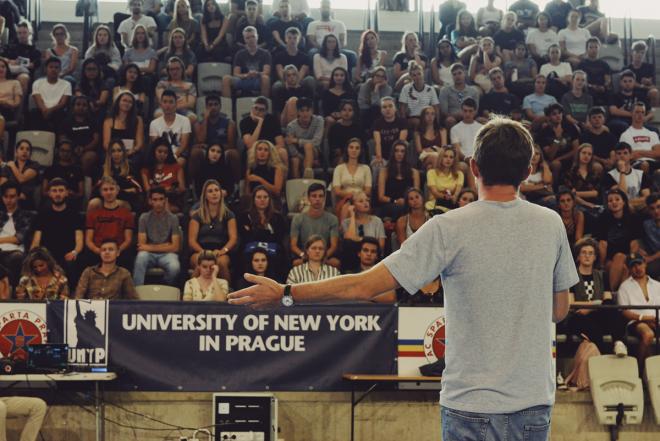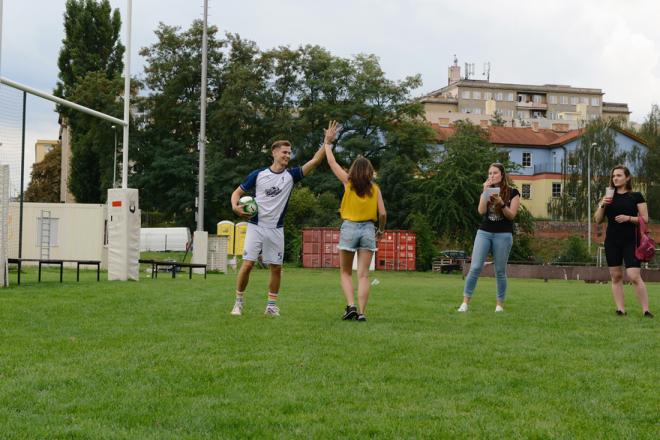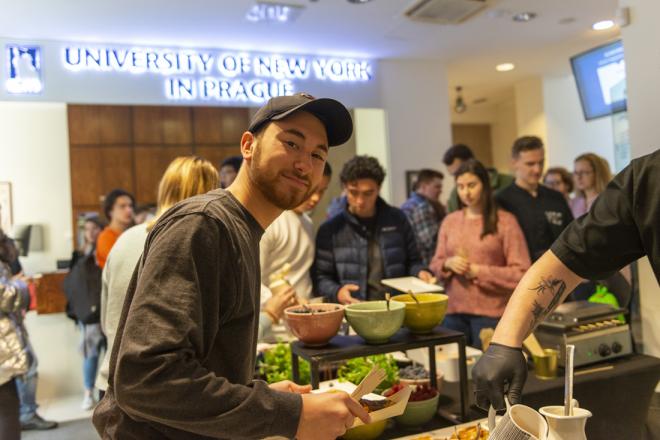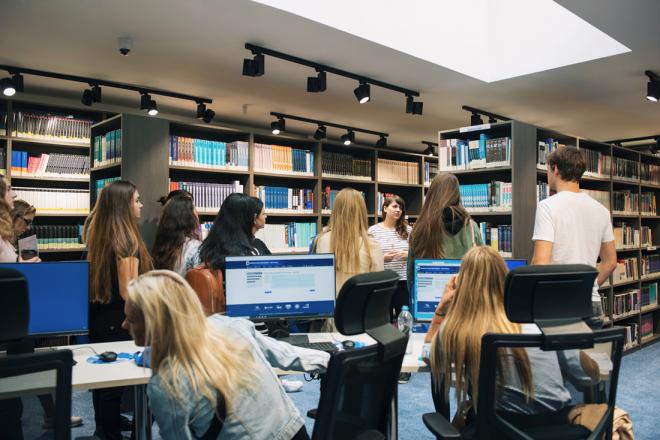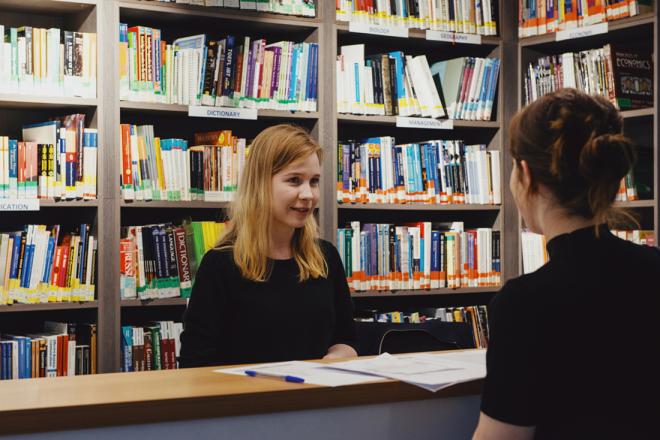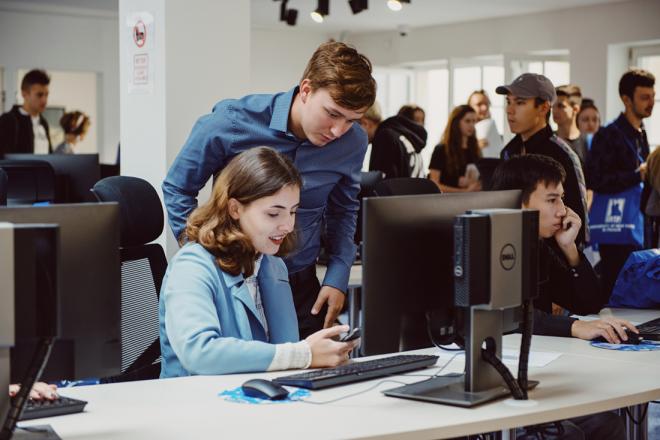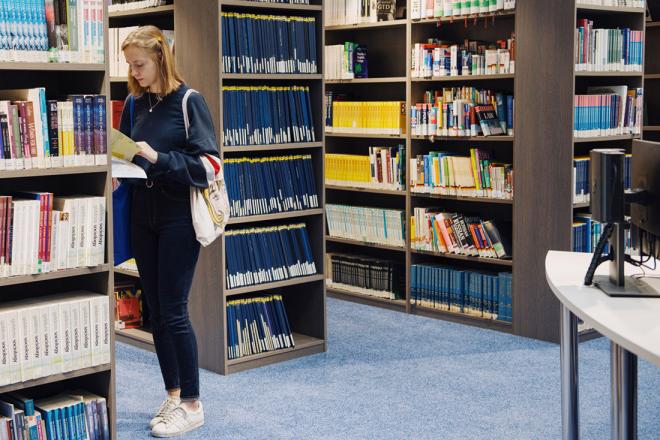International education has been at the core of UNYP’s existence since its founding in 1998. Established in 1998 in partnership with two American universities to offer foreign degree programs in English in the Czech Republic, and currently one of only three higher education institutions in the Czech Republic offering Czech-accredited programs entirely in English, UNYP has long been at the forefront of international education in the Central European region. Currently, UNYP not only offers Bachelor’s and Master’s programs in its own right as a recognized higher education institution, but also partners with universities in the UK, US, and Germany to offer the degree programs of the partner schools, and has 41 degree or exchange partners in 17 countries on four continents.
UNYP’s international outlook is embedded in its mission to provide students with the “multi-cultural perspectives” that “will allow them to explore, learn, question, create, and thrive as productive members of the international community.” Its international character is seen not only in its degree offerings; it is apparent in the highly internationally diverse student population it serves and the academic staff who teach on the programs. While Czech students remain the largest group of UNYP’s students, they represented 26% of the student population in 2015, with the remaining students coming from over 60 different countries worldwide.
UNYP’s international strategy is designed to build upon this foundation and these strengths, and features prominently in the schools Strategic Goals 2016-2020, developed in consultation with UNYP students and academic staff. Among UNYP’s key goals was to earn the Erasmus Charter for Higher Education, and participation in the Erasmus+ program is a core component of UNYP’s internationalization strategy.
In building on its international foundation, UNYP seeks to inter alia:
- Enhance the recruitment of internationally diverse cohorts of students and staff.
- Increase the number of UNYP students incorporating a study or work stage abroad as a part of their degree studies.
- Provide a welcoming and supportive environment for international students and staff.
- Engage with alumni located around the world to provide valuable feedback on the institution’s curricula and operations, and create mentoring and career opportunities for students.
- Increase the employability of its students and further develop their intercultural competencies.
A core part of achieving these goals is developing international partnerships. UNYP seeks to develop partnerships with international universities based primarily on curricular, linguistic, and geographic synergies, and in addition seeks input from students on the geographic regions that are of interest to them. UNYP looks for institutions abroad that have a similar approach to teaching, offer similar or cognate degree programs, and emphasize English as a medium of instruction and communication
UNYP’s current exchange partners have extensive course offerings in English in the fields of study that UNYP offers, which facilitates student mobility. This general approach to selecting appropriate mobility partner universities is expected to continue, though as UNYP expands its provision of language instruction, more students are expected to take advantage of mobility stages to expand their language competencies and fulfill UNYP’s curricular requirements in the area of language.
For 2016-2020, UNYP is focusing on developing exchange partnerships with European universities, as most current exchange partners (about three-quarters) are from outside the EU. This move was reinforced by input from students. Starting in 2015, UNYP began surveying incoming students as to their interest in incorporating mobility stages into their studies, and the geographic regions they are interested in, as a further source of input to the partner selection process.
First-cycle student mobility will be the main focus of UNYP’s activities for 2016-2020, as the majority of UNYP’s students are Bachelor’s students. In particular, UNYP aims to increase the number of its outgoing students, as the school has historically received about twice as many students as it has sent out. Both an increase in outgoing student mobility and the development of curricular windows to support this have been formally set as part of the school’s strategic goals for 2016-2020.
While student mobility is the most salient of UNYP’s objectives for 2016-2020, UNYP also plans efforts in the area of traineeships for first-cycle students, a goal that is also reflected in its strategic plan for 2016-2020. Staff mobility, in particular, engaging UNYP teaching and administrative staff more extensively with international education organizations and partner universities, is expected to further develop the institution’s repertoire of international competencies. Lastly, the recent accreditation of UNYP’s first Master’s-level programs opens the door to increased participation in research activities at the international level.
UNYP has been an internationally oriented institution from its beginning, and its past and ongoing experience working with international partner universities has helped shaped the teaching, learning, and administrative processes it currently employs. Looking ahead, UNYP looks to the Erasmus+ program as a way to further expand, deepen, and diversity that set of international experiences and competencies.
Participation in the Erasmus+ Programme will further UNYP’s modernisation agenda in each of its five key priority areas:
1. Increasing the number of higher education graduates
At the broadest level, Erasmus+ will help UNYP attract, retain, and graduate more students as the university provides more opportunities for the education, personal growth, and career development of students and staff through Erasmus+ and other initiatives.
2. Improving the quality and relevance of teaching and learning
The quality and relevance of teaching and learning will improve as UNYP further expands and deepens its ties to international education institutions and organizations, and public and private sector actors around the world. UNYP’s mobility initiatives will help both students and staff become more engaged with the students and staff of other internationally oriented institutions, facilitating knowledge transfer and innovation. This sort of internationalization will mean increased visibility of the personal and professional benefits of international mobility, and a greater emphasis by UNYP on developing global competencies, including language skills.
3. Promoting mobility of students and staff and cross-border cooperation
Increased mobility will be the main focus of UNYP’s Erasmus+ activities, and the institution seeks to provide more diverse mobility options and more flexibility in incorporating a mobility stage into degree studies without extending the time to degree.
4. Strengthening the “knowledge triangle”, linking education, research, and innovation
The intensified level of participation by internationally mobile students and staff, as well as the university’s more sustained cooperation with a wider range of international higher education institutions, is expected to contribute to the institution’s knowledge base and allow innovations in teaching, learning, and research to reach and infuse UNYP more quickly and thoroughly, thereby strengthening the “knowledge triangle.”
At a more local level, UNYP also plans to strengthen the knowledge triangle by increased support for student participation in international student organizations and competitions, in which UNYP teams have had noted successes in the past; by incorporating traineeship and internship possibilities into the study programs; and by developing research collaborations, particularly in Master’s programs, with public and private sector bodies.
5. Creating effective governance and funding mechanisms for higher education
UNYP looks to further improve its governance and funding mechanisms through a number of initiatives and channels, including expanding and diversifying its funding sources, and by building closer ties to the worlds of public and private sector governance, commerce, and innovation.
